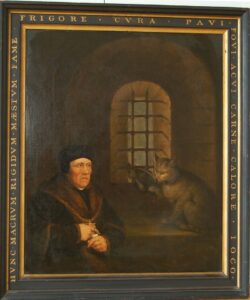On this day in Tudor history, 10th November 1536 (some sources say 1537), in the reign of King Henry VIII, Sir Henry Wyatt of Allington Castle died. He was buried at Milton in Kent.
Sir Henry Wyatt was a politician, courtier and privy councillor, and was also the father of famous Tudor poet Sir Thomas Wyatt the Elder.
In the video and transcript below, I want to share with you two interesting stories concerning this Tudor man and cats, pigeons and a lion…
On this day in Tudor history, 10th November 1536, (some sources say 1537) Sir Henry Wyatt of Allington Castle, politician, courtier, Privy Councillor and father of poet Sir Thomas Wyatt the Elder, died. He was buried at Milton in Kent.
Sir Henry had acted as an executor of King Henry VII’s will, and his offices during Henry VIII’s reign included Privy Councillor, Joint Captain of Norwich Castle, Knight-Banneret, Master of the Jewels, and Treasurer of the King’s Chamber.
There are two animal stories concerning Henry Wyatt. According to his son, Thomas Wyatt, writing to his son, Thomas Wyatt, the future rebel leader, Sir Henry Wyatt was once imprisoned. Thomas told his son that the Grace of God “preserved him in prison from the hands of the tyrant that could find in his heart to see him racked, from two years and more prisonment in Scotland in Irons and Stocks, from the danger of sudden changes and commotions divers, till that … he went to him that loved him […]” and according to family legend, Sir Henry was close to death from starvation when he was saved by a cat.
Annette Carson of the Richard III Society notes that the story comes from the 18th century Wyatt papers, and specifically from Richard Wyatt in 1731 when he copied text from ‘Passages taken out of a Manuscript wrote by Thomas Scott of Egreston in Godmersham Esquire concerning the family of Wyatt of Alington’. Here is what Richard copied:
“He was imprisoned often, once in a cold and narrow Tower, where he had neither bed to lie on, nor clothes sufficient to warm him, nor meat for his mouth. He had starved there, had not God, who sent a crow to feed his prophet, sent this and his Country’s martyr a cat both to feed and warm him. It was his own relation unto them from whom I had it. A cat came one day down into the dungeon unto him, and as it were offered herself unto him. He was glad of her, laid her in his bosom to warm him, and by making much of her won her love. After this she would come every day unto him divers times and, when she could get one, bring him a pigeon.
He complained to his keeper of his cold and short fare. The answer was he durst not better it.
But, said Sir Henry, if I can provide any, will you promise to dress it for me?
I may well enough said he, you are safe for that matter; and being urged again, promised him and kept his promise, dressed for him from time to time such pigeons as his accator the cat provided for him.
Sir Henry Wyatt in his prosperity for this would ever make much of cats, as other men will of their spaniels or hounds; and perhaps you shall not find his picture any where but, like Sir Christopher Hatton with his dog, with a cat beside him.”
And there is indeed a painting of Henry in prison with a cat pulling a pigeon through the bars of his prison window. I’ll give you a link to see it – http://www.artwarefineart.com/archive/gallery/portrait-sir-henry-wyatt-circa-1460-1536, or you can see it below.
Another story concerning Sir Henry and his son, Thomas. It is said that in Thomas’s childhood, his father Henry was raising a lion cub as a pet. One day, it suddenly turned on Thomas and attacked him. Thomas had the presence of mind to grab his rapier and run it through the lion’s heart. When King Henry VIII heard of this story, he was said to comment “Oh, he will tame lions”.
